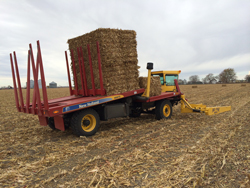 Biodiesel giant Renewable Energy Group has added an international business veteran to its board of directors. This company news release says Peter J. M. Harding was elected to the post.
Biodiesel giant Renewable Energy Group has added an international business veteran to its board of directors. This company news release says Peter J. M. Harding was elected to the post.
Harding has served in leadership roles for international businesses involved in commodities trading and asset management. Most recently, he was the Chief Executive Officer and a member of the Board of Directors of Westway Group, Inc. (“Westway”), a liquid storage and liquid animal feed business, from May 2009 until his retirement in June 2010.
“Peter Harding has had a distinguished career where he gained expertise in the different industries that are part of the REG supply chain,” said Jeff Stroburg, Chairman of the Board. “His diverse skillset and business know-how will be a great asset to our board and our company.”
Harding has also served as a member of the Board of Directors of New Orleans College Prep since 2008 and was appointed Chairman of the Board in July 2013. From 2003 until joining Westway, Mr. Harding served in various roles at ED&F Man, including as member of their Executive Committee, Board of Directors and Managing Director of their Molasses & Palm Oil Trading, Feed Products, Third Party Storage, and Biofuels Division. He also served as Chief Executive Officer of Westway Holdings Corporation from 1997 to 2006. Concurrent with his service as Chief Executive Officer, he served as President of Westway Terminal Company, Inc. from 2001 to 2004. From 1995 to 1997, Mr. Harding also served as Chief Executive Officer of ED&F Man’s North American Cocoa Processing Group and prior to that as Chief Executive Officer of Savannah Cocoa, Inc. from 1992 to 1995. Mr. Harding served as Vice President of Sales & Marketing of Refined Sugars, Inc. from 1985 to 1989. Additionally, Mr. Harding owned and managed an asset management firm and commodity fund during the late 1980’s and early 1990’s. Mr. Harding attended the Harvard Business School program for Management Development in 1985.
Harding’s term will expire in 2017.











